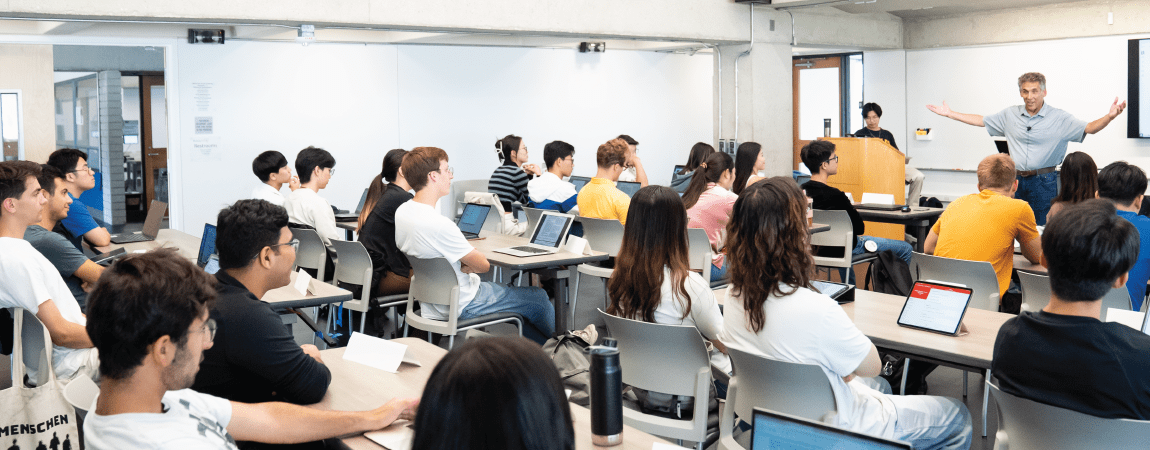The Fung Institute has sponsored the following courses in an effort to provide leadership training for UC Berkeley students at the undergraduate and PhD level. For a full list of courses offered at Berkeley each semester, check out the online schedule of classes.
This course provides engineering majors with the fundamental skills for effective technical communication. During the course of the semester, students will develop communications for public dissemination, covering a project or initiative within UC Berkeley’s College of Engineering. This work will call on students to: (a) cultivate interest in a broad range of topics related to Engineering; (b) become an engaged and critical reader of academic and general-interest science publications; (c) learn how to assess, plan for, and respond to a variety of communicative situations; (d) produce focused, and at the same time, narratively-rich, accounts of Engineering research. View more information.
2023 Summer Session A
ENGIN 185 001 – LEC 001
Format: Online
Dates: May 22-June 30 (6 weeks)
Instructor: Dr. Mark Bauer
The past three years have shown that the need for clear science writing is stronger than ever. They have also underscored that the challenges of communicating scientific principles and findings lie not simply in the complexity of those ideas, but in audiences’ willingness and ability to listen. How, then, can writers offer compelling narratives about scientific and technological impacts amid the din of competing interests and outright misinformation? In this environment, science writing needs not just to be clear, but persuasive, and that requires writers to mobilize strategies that go well beyond the usual imperative to report and contextualize data.
This seminar seeks to develop a toolkit for writers who are looking to convince decision makers about the need to incorporate research findings into their planning, and also to convince a broad audience of non-scientists about the importance of acting on them. From mask mandates to climate policy, we’ll consider not only how to make our points effectively, but also how to account for other, often conflicting interests that audiences are weighing when thinking about how to prioritize scientific findings. To achieve these goals, we’ll draw lessons from reading case studies and other works by experts in the field, and students will write a variety of pieces ranging from short summaries to longer academic research papers.
The course examines the challenges of innovation beyond new technology development: from the challenges of global expansion, to the issues of unintended consequences of technology and the ability of technology to support or hinder social justice. The course will provide examples in a variety of global locations (e.g., Latin America, Southeast Asia, Africa, China, and India), utilizing case examples (written and presented by speakers) that illustrate the challenges faced in a range of fields of engineering and technology, from water and transportation to information and communications technology, and from start-ups to major corporations, government entities, and policy makers. View more information.
Terms offered: Fall 2019
Sponsored by Dean Tsu-Jae King Liu and the Fung Institute for Engineering Leadership; ENGIN 295 (SEC 14) Communications for Engineering Leaders, PhD level is a 2-day, 1-unit course in the fundamentals of authentic leadership with EQ, interpersonal communication and making presentations in today’s business environment. The course focuses on authenticity, persuasion, and advocacy. Each student will deliver several speeches (both impromptu and prepared) and will take part in several class exercises. Final written projects synthesize the in-class experience and provide students with an opportunity to practice written communication skills.
Course Objectives:
- To find your voice as an authentic engineering leader and enhance professional and leadership skills through authentic communication.
- To develop leadership presence — the skill set that enables an individual to motivate, inspire and connect to his or her audience.
- To improve individual presentation style and storytelling ability, including the use of voice, body, focus, spontaneity, and energy.
Spring 2022 Details:
The Spring 2022 workshops will be taught by Susan Houlihan and Thomas Fitzpatrick and meets IN PERSON; schedule details will be communicated by the instructors.
- ENGIN 295 – LEC 001 (class 17775) is held Thursdays, February 2 and 16, between 9am-6pm (limited to 20 students)
- ENGIN 295 – LEC 002 (class 17776) is held Thursdays, March 2 and 16, between 9am-6pm (limited to 20 students)
Registration Policies:
- Open to all College of Engineering Doctoral Students on a first come, space available basis.
- This course is offered for a letter grade. Students who qualify may choose to take it on a S/U basis.
- Students must commit to attend the full time, both days, to enroll and receive credit.
- Students may not mix and match attendance between sections.
- The catalog/schedule description of E295 applies to the MEng version, please see above for this PhD workshop description.
Questions? Email Beth Leven at leven@berkeley.edu
Quotes from past participants:
“This was fantastic and I learned so much; how to be effective in being a leader and also how to communicate your thoughts and ideas in a way that others understand — through logic and also emotions.”
“The feedback I received during the coaching session was most valuable. The subsequent brainstorming was useful for figuring out how to improve my presentation.”
Read more about the course and instructors in this Medium post.
Units: 2
Terms offered: Spring
This course provides the framework for leadership development. The class focuses on development of self and emotional intelligence; identification of core values, creation of purpose statements; growth mind-set; ethical decision-making; inspiration of others, conflict resolution, goal setting and teamwork; global and cultural awareness; and development of plans of action. Weekly introspective reflections are required. The class comprises three parts: (I) Exploration of your leadership journey; (II) Discovery of your Personal Leadership Style; and (III) Development of a Personal Leadership Plan. View more information.





